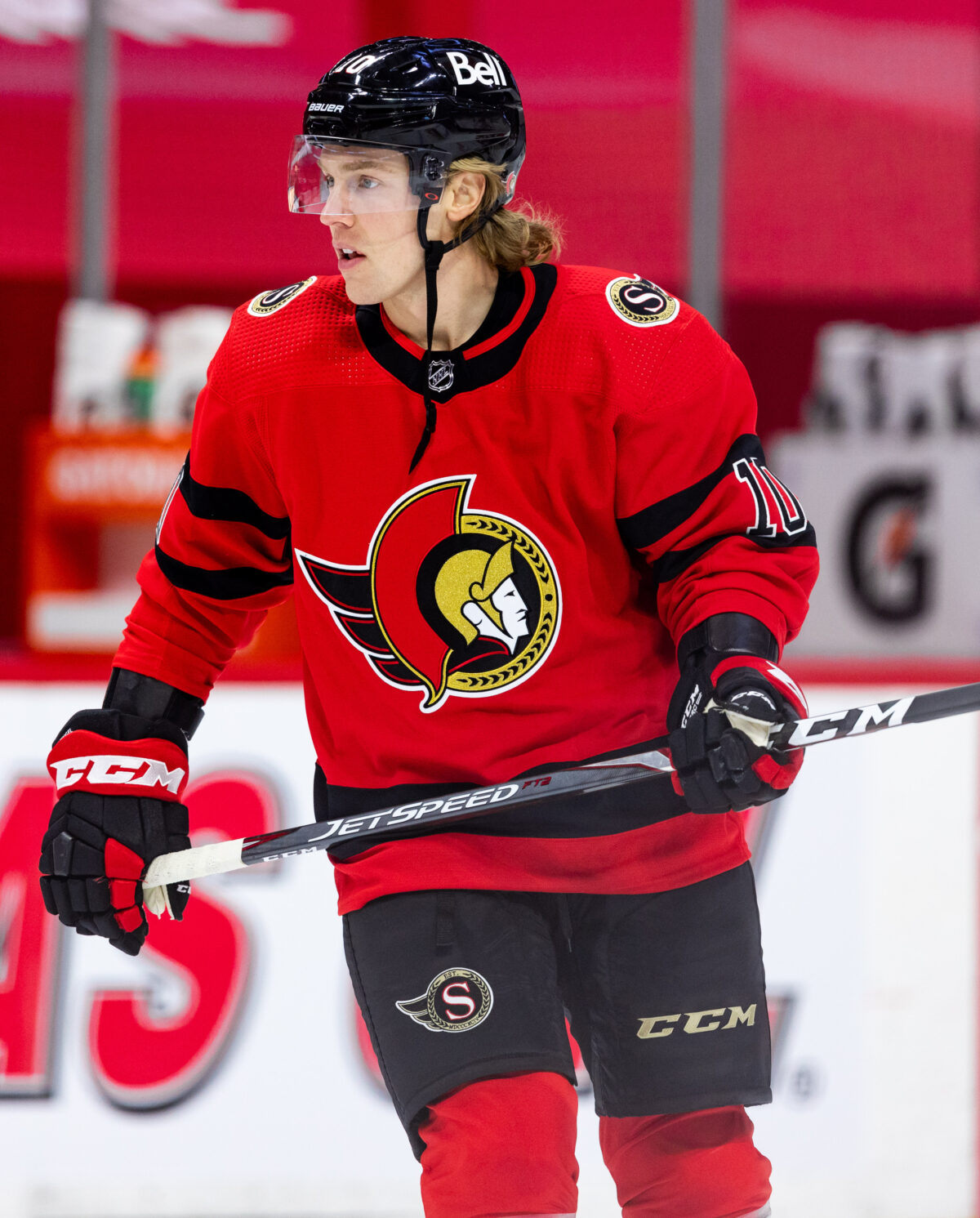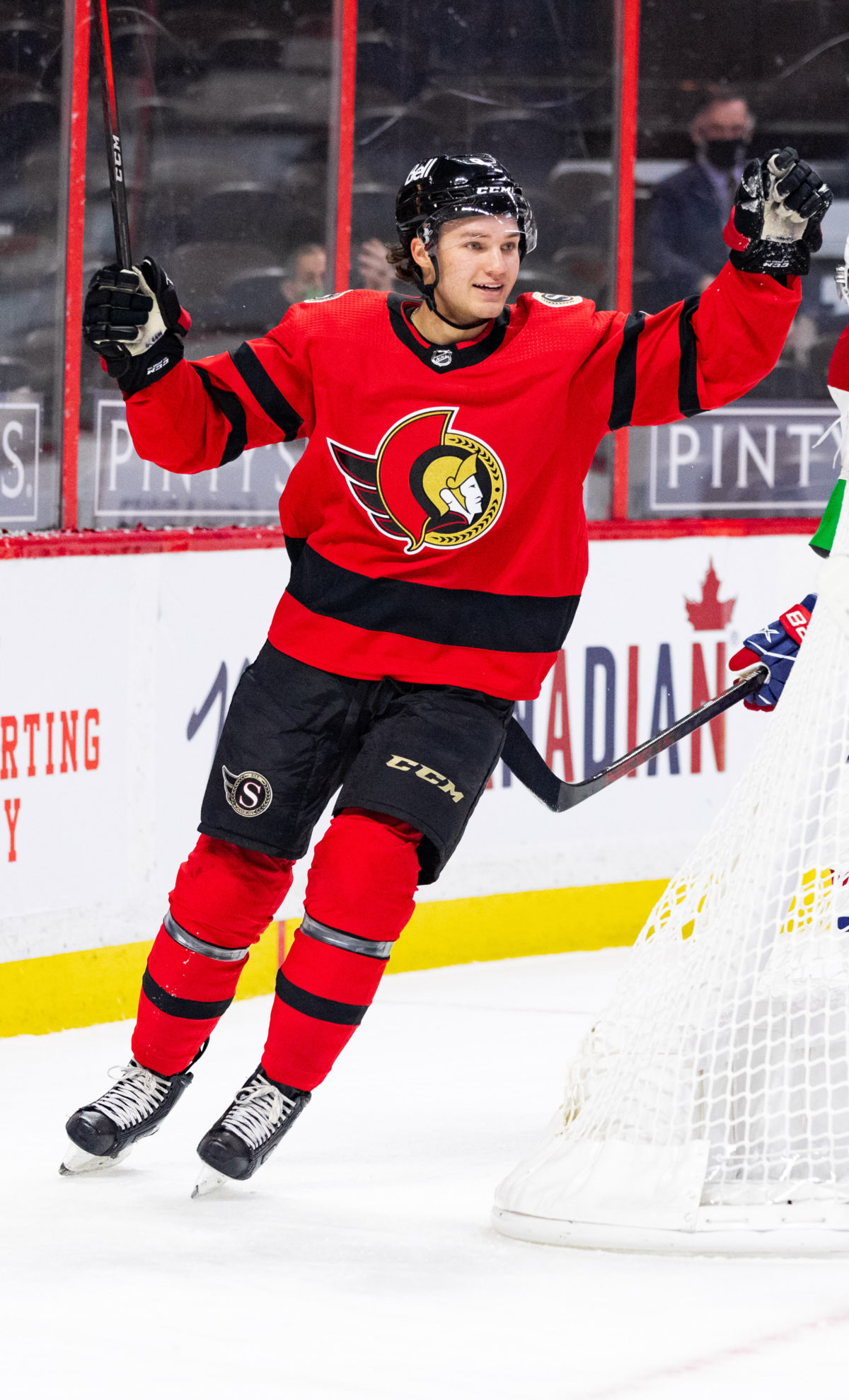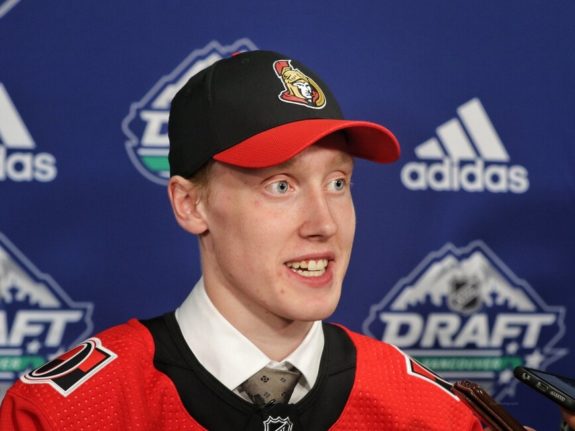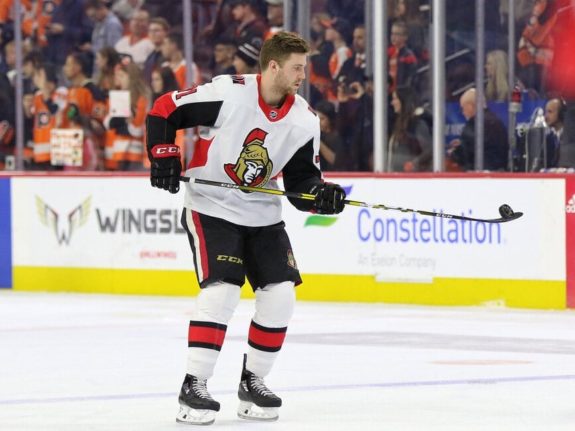It’s hard to believe in this compressed season — that feels like it just started — that the NHL Tradeline is only three weeks away. The Ottawa Senators are out of big name assets to move, as the Erik Karlssons, Mark Stones, Mike Hoffmans and Jean-Gabriel Pageaus have all been moved for future building blocks.
Clearly, the team is not going to land first-round picks or elite prospects for the assets they are about to move. But they do have some pieces that might complete the puzzles that other NHL general managers are trying to put together before the playoffs begin.
The April 12, 3 p.m. EST deadline will have some variables and moving parts compared to normal deadlines. But this is 2020-21. Why would it not be complicated?
The first variable in this year’s draft is the COVID-19 pandemic. This will be less of a factor for Ottawa than it will be for Canadian teams like the Edmonton Oilers, Winnipeg Jets and Toronto Maple Leafs, who may be buyers.
When Ottawa traded Cedric Paquette to the Carolina Hurricanes, he got in his car and drove to Raleigh-Durham. The player he was traded for, Ryan Dzingel, had to stick it out in a hotel room in Ottawa while he went through a 14-day quarantine before he could play. Players going to Canadian-bound playoff teams will have to quarantine, while players going the other way can step right into the lineup.

The Senators will be sellers, and the assets they will have coming back will be draft picks and prospects.
Another part of the equation is the expansion draft. The Seattle Kraken will enter the league under the same rules that the Vegas Golden Knights did. Each team can protect one goaltender, three defencemen, and seven forwards; or they can protect eight skaters and one goaltender. They also have to leave at least two forwards, a defenceman, and a goaltender who are signed through next season and meet a games-played requirement exposed for the draft.
So, if the Senators get an offer for a player like Colin White, Connor Brown or Nikita Zaitsev, they will have to determine if they are more valuable to the team as players to leave unprotected in the expansion draft than what would come back to Ottawa in a trade.
The Big Garage Sale
Over the past two seasons, the Senators were sellers. The wheeling and dealing could be called a garage sale, but it was more than that. It was the biggest roster enema in franchise history.
The deal that put the rebuild machine in motion was the Karlsson deal with the San Jose Sharks during training camp of the 2018-19 season. Senators fans were devastated and many revolted. But looking back at the deal now, Ottawa was the big winner. Potential Calder Trophy candidate Josh Norris was part of the deal, along with Chris Tierney, Dylan DeMelo and Rudolfs Balcers. There was also a first-round draft pick that went to the Senators. That pick was used to select Tim Stützle.

Norris and Stützle are key building blocks for the Senators’ future. Karlsson has underachieved in San Jose, is complaining that he does not want to be part of a rebuild, and has a long-term contract that has handcuffed the team. Unless he regains his form as an elite player, the deal puts the declining superstar on an orbital path for a future buy-out.
As the trade deadline approached in the 2018-19 season, the wheeling and dealing began. The first big deal is worth mentioning because it was so unusual. The Vancouver Canucks were in Ottawa, and just hours before the game, the teams pulled off a deal that saw their backup goalies traded for each other. The Senators acquired goalie Anders Nilsson and forward Darren Archibald, while Vancouver landed goalie Mike McKenna and forward Tom Pyatt. The goalies passed each other awkwardly, with their gear in hand, in the Canadian Tire Centre hallway.
Although there were some deals involving minor leaguers, the Senators did pull off two big deals as they started to tear the team down and commit to rebuilding.
Matt Duchene was sent to the Columbus Blue Jackets for forward Vitaly Abramov, defenceman Jonathan Davidsson and a first-round pick that ended up being defenceman Lassi Thomson. All three of the players acquired for Duchene are currently playing in the AHL for the Belleville Senators.

Two days later, the Senators sent Dzingel and a seventh-round pick to Columbus for Anthony Duclair, a 2020 second-round pick that was traded to Pittsburgh, and a 2021 second-round pick. The Senators let Duclair walk as a free agent, but were able to reacquire Dzingel from the Carolina Hurricanes. He scored five goals in his first nine games back with the team.
The big trade that was a soul crusher for Senators fans happened two days after the Dzingel deal. Stone, a fan favourite who was the heart and soul of the team, was sent to Vegas for first-round draft pick Erik Brannstrom, forward Oscar Lindberg, and a 2020 second-round draft pick. Brannstrom continues to develop as a puck-moving defenceman, and Lindberg left for Russia as a free agent after 20 games in Ottawa.
With the draft pick, Ottawa selected Egor Sokolov, a big, 6-foot-3, 220-pound winger who had 92 points in 52 games with Cape Breton (QMJHL) in 2019-20. He had an impressive camp and is currently in the AHL with the Belleville Senators.
Dylan DeMelo was sent to the Winnipeg Jets for a third-round pick, who turned out to be goalie Leevi Merilainen of Finland.
Vladislav Namestnikov was sent to the Colorado Avalanche for a 2021 fourth-round pick.
Jean-Gabriel Pageau was sent to the New York Islanders for a first-round pick, a second-round pick, and a 2022 conditional third-round pick. The Senators picked centre Ridly Greig with the first-round pick, while the second-round pick was flipped to the Toronto Maple Leafs.
Potential Moves
Looking at this year’s deadline, the Senators do not have the assets to make a big deal for first-round draft picks and high-end prospects. However, they do have some assets they can move.
Dzingel is an unresistrcited free agent at the end of the 2020-21 season, and his arrival in Ottawa has sparked his offensive output. They already got a good return for him once. Now, they must decide whether to move him for the future, or sign him to a contract extension. If he will not agree to a two- or three-year deal, he could be dealt.
Defenceman Mike Reilly is easily the most improved player on this team from opening day to the present. He is starting to show the potential as an offensive defenceman he showed during a storied collegiate career. He could be moved to make room for the deep load of blue line prospects.

While the Senators do not want to let any building blocks go, one player who could be pushed out is Christian Wolanin. There is not room in the lineup for Brannstrom, Reilly and Wolanin, who are all known for being puck carriers and breakout players. Wolanin is 26 years old now. The Senators are going to let him play in the next couple of weeks to either see what they’ve got with him, or showcase him to move him to a team where he might be a better fit.
Chris Tierney is a player who could spark interest. Tierney is a good third-line centre who is defensively responsible and can also kill penalties. He could attract interest from a team looking to add depth for a playoff run.
Veteran defenceman Erik Gudbranson is another player who could be moved at the deadline to a team looking to add size, grit and depth to its blue line for a playoff run.
The key for Ottawa is that they do not want to move players for sixth- and seventh-round draft picks. They will need a return for their veterans. Getting that return will be general manager Pierre Dorion’s toughest trade deadline challenge to date.
Jeff Morris has been a hockey writer for more than 30 years. He began his career working for small town newspapers in Eastern Ontario before becoming the editor of Canadian Sports Collector magazine in St. Catharines, ON. While there, he also freelanced as a Buffalo Sabres beat writer. Morris would move on to Dallas to become the NHL brand manager at Pinnacle Brands, Inc. From there, he worked in the sports trading card and collectibles division at Shop At Home TV in Nashville and Denver, and then moved to Seattle to be the VP of Marketing at Pacific Trading Cards, Inc. in Seattle. He had continued to cover the NHL as a freelance writer, and while in Seattle, he became a weekly hockey columnist for ESPN.com. During the 2005 NHL lockout, he returned to Ottawa and became a newspaper and magazine publisher and editor, and was also an NHL contributor for Fox Sports Radio. He also began covering the NHL for Hockeyology.com, and also covered the Ottawa Senators for his own publications. He went to Carleton University to study journalism, and graduated as the school’s all-time scoring leader in football and was a conference all-star three times. He had several pro tryouts and played semi-pro football for 10 years while pursuing his career as an NHL writer. He remains involved in football as a coach and referee, and is a Canadian Football League off-field official.